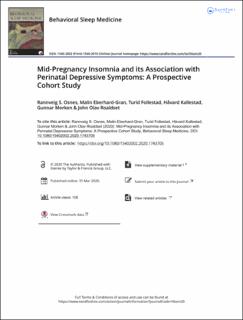| dc.contributor.author | Osnes, Rannveig Storaune | |
| dc.contributor.author | Eberhard-Gran, Malin | |
| dc.contributor.author | Follestad, Turid | |
| dc.contributor.author | Kallestad, Håvard | |
| dc.contributor.author | Morken, Gunnar | |
| dc.contributor.author | Roaldset, John Olav | |
| dc.date.accessioned | 2020-04-22T17:00:02Z | |
| dc.date.available | 2020-04-22T17:00:02Z | |
| dc.date.created | 2020-04-21T18:19:53Z | |
| dc.date.issued | 2020 | |
| dc.identifier.citation | Behavioural Sleep Medicine. 2020, . | en_US |
| dc.identifier.issn | 1540-2002 | |
| dc.identifier.uri | https://hdl.handle.net/11250/2652154 | |
| dc.description.abstract | Objective/Background: Insomnia and depression are disorders that affect many perinatal women and that often are interrelated. The present study aimed to examine concurrent and prospective associations between mid-pregnancy insomnia and depression during mid-pregnancy and 8 weeks postpartum. Furthermore, differences in depression and in the sleep-related characteristics insomnia, chronotype, and sleep efficiency were explored between the two time points (mid-pregnancy versus 8 weeks postpartum), and between primiparous and multiparous participants.
Participants/Methods: The study was part of the Norwegian population-based Depression and Anxiety in the Perinatal Period (DAPP) prospective cohort study. Among 539 women that were recruited for participation when receiving a routine ultrasound examination, we analyzed data from hospital birth records and questionnaire responses from pregnancy week 17 and postpartum week 8. We used the Edinburgh Postnatal Depression Scale to measure depression. The Bergen Insomnia Scale, the reduced Horne-Östberg Morningness-Eveningness Questionnaire, and three questions from the Pittsburgh Sleep Quality Index were used to measure the sleep-related characteristics.
Results: Mid-pregnancy insomnia was significantly associated with concurrent depression (p < .001), but not with postpartum depression (p = .288), in a linear mixed model with adjustment for several reproductive and psychosocial variables. Sleep efficiency was reduced from mid-pregnancy to postpartum (from 88% to 77%), and primiparous women reported less efficient sleep than multiparous women after childbirth.
Conclusions: The results indicate that mid-pregnancy insomnia may be a marker for concurrent depression but not a predictor of postpartum depression. Future research should examine the extent to which treatment of insomnia from mid-pregnancy on reduces both perinatal insomnia and depression. | en_US |
| dc.language.iso | eng | en_US |
| dc.publisher | Taylor & Francis | en_US |
| dc.rights | Navngivelse 4.0 Internasjonal | * |
| dc.rights.uri | http://creativecommons.org/licenses/by/4.0/deed.no | * |
| dc.title | Mid-Pregnancy Insomnia and its Association with Perinatal Depressive Symptoms: A Prospective Cohort Study | en_US |
| dc.type | Journal article | en_US |
| dc.type | Peer reviewed | en_US |
| dc.description.version | publishedVersion | en_US |
| dc.source.pagenumber | 18 | en_US |
| dc.source.journal | Behavioural Sleep Medicine | en_US |
| dc.identifier.doi | 10.1080/15402002.2020.1743705 | |
| dc.identifier.cristin | 1807408 | |
| dc.description.localcode | © 2020 The Author(s). Published with license by Taylor & Francis Group, LLC. This is an Open Access article distributed under the terms of the Creative Commons Attribution License (http://creativecommons.org/licenses/by/4.0/), which permits unrestricted use, distribution, and reproduction in any medium, provided the original work is properly cited. | en_US |
| cristin.ispublished | true | |
| cristin.fulltext | original | |
| cristin.qualitycode | 1 | |

